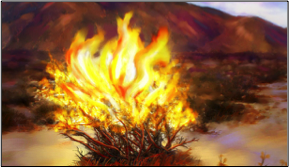
In this week’s first reading from Exodus, the voice in the burning bush said that I was known to your fathers as “God Almighty” but now “I Am Who I Am.” The sacred letters that form this new name of God, “YHWH” were so sacred that whenever these letters were read out loud they were replaced by the word which in English is “Lord.”
But in English we are not so reluctant to use these words. “I am…” is a frequent and quite ordinary expression whenever introductions are made. One very famous use of this introduction is the title of the book “I Am Malala” by the Nobel Prize winner, Malala Yousafza. I wondered when I saw it if she knew she had used this sacred phrase.
Malala’s book is about the effort to become educated and the distress this caused people who did not want girls to be educated. They shot her but did not kill her and so she wrote this book. When you stop to think about how we become who we are we realize that education has a great deal to do with it: I am a surgeon; I am a nurse; I am a teacher; I am an electrician…But perhaps more importantly our very learning of our Mother Tongue from our mothers helps define us: I am English; I am French…
Malala was a Muslim girl who learned from Mohammed that it is good to learn everything you can about the world and all that is in it because there is no contradiction between God and his world. Historically the Arab world gave us great treasures of knowledge – mathematics and philosophy for example. It was through Islam that St Thomas Aquinas learned about Aristotle.
But some of Mohammed’s followers do not want to follow him into modern science, particularly the science that looked not to the stars but into ourselves, into our deepest recesses–our genetic make-up. What modern science taught us is that women and men both contribute to our fundamental nature. Mohammed’s science taught him differently: that a man carries the future child within himself and the mother was only what we now call a “surrogate” mother. That science required that education for men and women would be quite different.
The Burning Bush told us a new name for God, which implied a new understanding of ourselves. We need the fire that makes us love to learn and to become who we are. But what we learn will never be the same as who we are. Everyone’s knowledge is partial. Someone else knows something else. The fire that gives life burns up the bush that supports it. We must sometimes give up our own limited knowledge and acknowledge that someone else knows better if we want to become who we truly are.
I am.
Agnes Beirne
MAR
2019

About the Author: